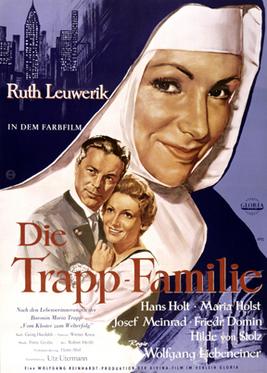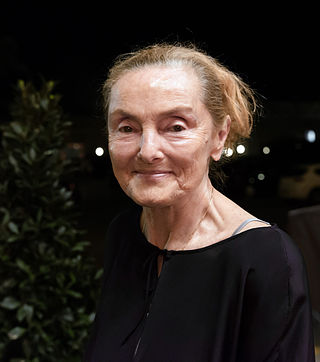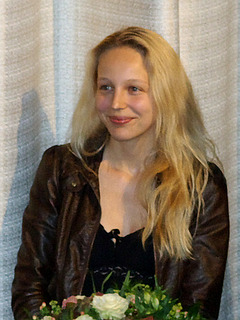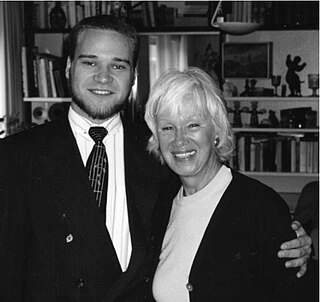
Anna Maria Geertruida "Annie" Schmidt was a Dutch writer. She is called the mother of the Dutch theatrical song, and the queen of Dutch children's literature, praised for her "delicious Dutch idiom," and considered one of the greatest Dutch writers. An ultimate honour was extended to her posthumously, in 2007, when a group of Dutch historians compiled the "Canon of the Netherlands" and included Schmidt, alongside national icons such as Vincent van Gogh and Anne Frank.
Thomas Fritsch was a German film, television and dubbing actor and schlager singer. He was regarded as the "Sonnyboy" in the German cinema of the 1960s, and became one of the best-known actors by his presence in television series. Later, he was the German voice of Russell Crowe, of Scar in The Lion King, and of Diego, a Smilodon, in Ice Age.
Bayerischer Fernsehpreis is an award presented by the government of Bavaria, Germany since 1989. The prize symbol is the "Blue Panther", a figure from the Nymphenburg Porcelain Manufactory. The prize money is €10,000.
Johann Gottfried Schnabel was a German writer best known for his novel Insel Felsenburg. He published his works under the pen name Gisander.

The Trapp Family is a 1956 West German comedy drama film about the real-life Austrian musical family of that name directed by Wolfgang Liebeneiner and starring Ruth Leuwerik, Hans Holt, and Maria Holst. Based on Maria von Trapp's 1949 memoir, The Story of the Trapp Family Singers, the film is about a novice nun sent to care for the unruly children of a wealthy baron, who falls in love with and marries the young woman. Through her caring influence, the family becomes a famous singing group. When the baron is pressured to join Hitler's navy, the family escapes to the United States, where they establish themselves as singers.

Erni Mangold is an Austrian actress and stage director. Since 1948, she had appeared in more than 75 films and TV productions.

Petra Schmidt-Schaller is a German actress. She is noted for the roles of Helene in Runaway Horse alongside Ulrich Noethen, Ulrich Tukur and Katja Riemann, and Maud Brewster in The Sea Wolf alongside Thomas Kretschmann.

Peter Weck is an Austrian film director and actor. In addition to his about 130 film and television acting credits between 1954 and 2015, he worked as a director on more than 50 productions between 1969 and 2007.

Maria Katharina Helene Sebaldt was a German actress.
Die Hesselbachs is a German radio play series. The series started in 1949 and was adapted for television in 1960. There was also a film Die Familie Hesselbach (1954) and its sequels.
Thomas "Tommi" Ohrner is a German actor, singer and television host. Beginning a career as a child actor at the age of four, Ohrner rose to prominence as a teen idol during the early 1980s, starring in the television series Timm Thaler, Merlin and Manni, der Libero, as well as achieving crossover success as a singer with his English-language pop singles, "Rock 'n' Roll in Old Blue Jeans" and "5 O'Clock Rock". In the 1990s, Ohrner turned to work as a television and radio host before once again returning to acting, most notably as Matthias Brandner on the German soap opera, Verbotene Liebe.
Paul Karl Heinrich Klinksik was a German stage and film actor who also worked in radio drama and soundtrack dubbing.

Herbert Köfer was a German actor, voice artist, and television presenter. He was the first German TV news presenter for the East German Deutscher Fernsehfunk, and also presented the station's last news before the reunification of Germany. His first theatre engagement was in 1940, and he kept acting until the age of 100. Köfer played an SS-Hauptsturmführer in the 1963 film Nackt unter Wölfen. He was known for detective series such as Polizeiruf 110 and for comic roles. He founded his own troupe, Köfers Komödiantenbühne, in 2003, and published memoirs.
Christa Schmidt is a retired German politician (CDU). She served as a minister in the last government of East Germany. She had built an earlier career as a teacher and educationalist.
Wolfram Röhrig was a German pianist, composer and conductor, who also worked under the alias Wolf Droysen. A jazz pianist, he was the director of music departments of the broadcasters Hessischer Rundfunk and Süddeutscher Rundfunk, responsible for light music and jazz. With the choir Nürnberg Lehrergesangverein from Nuremberg, Germany, he performed and recorded works such as Te Deum compositions by Anton Bruckner and Heinrich Sutermeister, and Max Reger's Der 100. Psalm.

Rolf Alexander Wilhelm was a German composer, film composer, arranger and conductor.
Helga Neuner is a German actress.

Kurt Julius Sterneck was an Austro-German stage and film actor, radio drama narrator and director.








